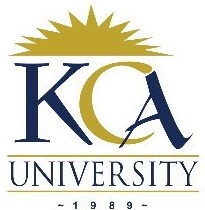
UNIVERSITY EXAMINATIONS: 2012/2013
EXAMINATION FOR THE BACHELOR OF SCIENCE IN
INFORMATION TECHNOLOGY
BIT 4401 KNOWLEDGE MANAGEMENT (DAY & EVENING)
DATE: AUGUST, 2013 TIME: 2 HOURS
INSTRUCTIONS: Answer Question ONE and any other TWO Questions
QUESTION ONE
a) Read the following text and answer the questions below.
Baker Hughes has several gradations of officially recognized expertise, and experts must
meet certain requirements to move up the levels. The Knowledge Management (KM)
team has proposed that, before being designated as subject matter expert, employees
should have to take on certain KM responsibilities, including:
i) managing a community of practice,
ii) contributing articles to the enterprise wiki,
iii) answering discussion forum questions, and
iv) making themselves available through the expertise location system.
If management approves this proposal, it will increase employee engagement in KM and
serve as a powerful message about the value Baker Hughes places on knowledge sharing.
Required:
(i) Define community of practice. (2 Marks)
(ii) Explain the concepts: expertise and expert. (2 Marks)
(iii) Explain the benefits of having community of practices in an organizations.
(4 Marks)
(iv) Explain the role of expertise location system in an organization. (3 Marks)
(v) Explain the role of enterprise wiki. (1 Mark)
(vi) What type of knowledge is aimed to be transferred or shared through anwering
discussion forum questions? (1 Mark)
(vii) If your were one of the managers in the organization, would you support this
proposal? Explain your decision. (4 Marks)
b) Define and describe the role of the following artificial intelligent based systems as
used in knowledge management. (8 Marks)
(i) Case based reasoning
(ii) Genetic algorithms
(iii) Neural networks
(iv) Intelligent agents
c) There might be as many definitions of knowledge or knowledge management as there
are authors and philosophers who try to define it.
(i) What is your definition or understanding of the core concept “Knowledge”?
(2 Marks)
(ii) What is your definition or understanding of the core concept “knowledge
management”? (5 Marks)
QUESTION TWO
a) Explain the Four ways of knowledge creation as argued by Nonake (1991; Nonaka
and Takeuchi ,1995) commonly referred as SECI model. (8 Marks)
b) Outline at least six enablers of knowledge management in an organization.
(6 Marks)
c) Explain the role of information technology in knowledge management. (6 Marks)
QUESTION THREE
At integrated energy company ConocoPhillips, collaboration is underpinned by a system
of 140 formal, interlinked networks of excellence. The networks—groups of employees
from different locations and business units who belong to a given discipline or functional
area—are designed to enable horizontal workflows and discourage silo-based thinking
and sharing. The objective is for members to build trusted relationships and then leverage
those relationships to collaborate and share. Networks are held together by the passion
and commitment of their members, and they last as long as there is business value and
passion around the network topic.
In the context of the above text, answer the following questions:
a) Explain the impact of organizational culture in knowledge sharing. (8 Marks).
b) Explain three technologies that can be used to enhance collaborations in
ConocoPhillips. (6 Marks).
c) What is your understanding of “silo- based thinking”. Do we have silo-based
thinking in ConocoPhillips. (3 Marks).
d) Comment on the organizational structure of ConocoPhillips in relation to
knowledge management. (3 Marks).
QUESTION FOUR
a) Describe the role of the following knowledge management systems in knowledge
management. (8 Marks).
(i) Knowledge capture systems
(ii) Knowledge sharing systems
(iii) Knowledge application systems
(iv) Knowledge discovery systems
b) Explain the relationship between knowledge, innovation and competitive advantage.
(8 Marks)
c) Outline Four characteristics of organizations that have not embraced knowledge
management practices. (4 Marks)
QUESTION FIVE
a) As the Boomers start to retire, replaced by younger counterparts with less experience
and a greater tendency to job-hop, knowledge erosion is becoming a big problem for
organizations. Frequent mergers and acquisitions, internal reorganizations, evolving
skill sets, and an increasing reliance on contractors make it even harder to maintain
specialized knowledge over time. Explain any three strategies that can be used to
capture knowledge from baby boomers who are retiring. (6 Marks).
b) Explain three benefits of investing in knowledge management for a business
organization. (6 Marks)
c) Explain Four technologies that facilitate socialization in knowledge management.
(8 Marks).
